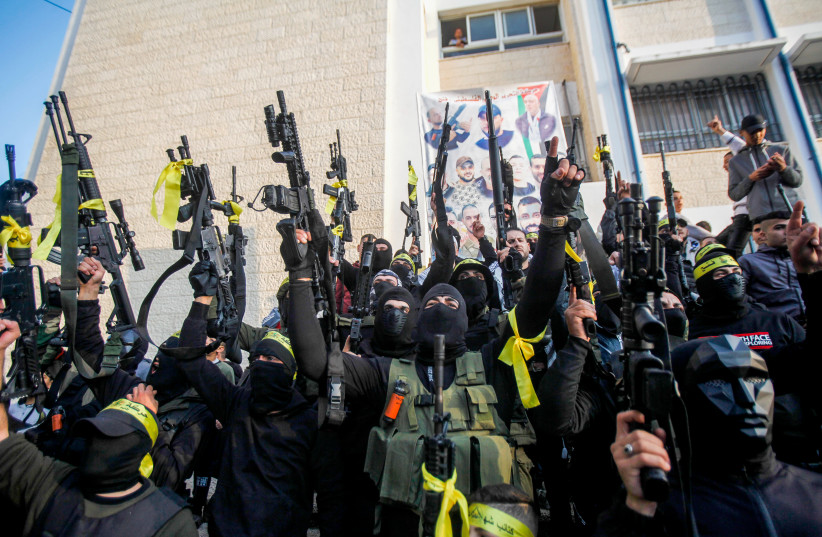Hamas and Palestinian Islamic Jihad (PIJ) have turned down a request by the Palestinian Authority to suspend their armed activities in the northern West Bank, Palestinian sources said on Wednesday.
On March 11, the two Iranian-backed groups boycotted a meeting of representatives of various Palestinian factions in Jenin. Initiated by senior officials from the PA and its ruling Fatah faction, the rare meeting was held as part of an effort to devise a “joint national program” to confront Israel.
Concern over new groups
The meeting came amid growing concern in Ramallah over the emergence of a number of armed groups, most of which are affiliated with Hamas and PIJ, in Jenin and Nablus over the past year.
PA and Fatah officials have also expressed deep concern over the cooperation between the armed groups that are affiliated with Hamas and PIJ and those belonging to the Al-Aqsa Martyrs Brigades, the armed wing of Fatah.
Since the security summit between Israeli and Palestinian officials in the Jordanian resort of Aqaba late last month, the PA has stepped up the pressure on Hamas and PIJ to restrain their men in the West Bank and refrain from giving Israel an excuse to continue its military operations in Palestinian cities and villages, the sources told The Jerusalem Post.

The PA security forces have since detained dozens of activists belonging to Hamas and PIJ, the sources revealed. In addition, senior PA and Fatah officials held a series of meetings with representatives of Hamas and PIJ in an attempt to persuade them to work towards de-escalating tensions with Israel, especially during the holy month of Ramadan, which begins on March 22.
The meeting in Jenin was held under the banner “The People, the Palestinian Authority, and the Resistance are in One Trench.” The motto reflects the PA’s desire to prevent Hamas and PIJ armed groups from operating independently and without coordination with Ramallah and other Palestinian factions.
The three main Fatah officials who attended the meeting were Azzam al-Ahmed, Tawfik Tirawi and Kadoura Fares.
The meeting came amid talk about another security summit scheduled to take place in the Egyptian Red Sea resort of Sharm al-Sheikh, where Israel and the Palestinians are expected to hold additional discussions on ways of increasing security cooperation and combating terrorism.
Hamas and PIJ were not the only parties to boycott the Jenin meeting. Fathi Khazem, the father of Ra’ed Khazem, who carried out the terror attack in Dizengoff Center in Tel Aviv last year, also boycotted the gathering. The father, who lost another son during an Israeli security operation in Jenin Refugee Camp, has become a leading figure in the northern West Bank. He previously served as an officer in the PA security forces.
In addition to Hamas and PIJ, representatives of the Palestinian National Initiative party abruptly walked out of the meeting in Jenin without offering any explanation. Several senior Fatah officials in the Jenin area also boycotted the meeting.
Hamas said it decided to stay away from the meeting after PA security officers fired tear gas canisters at mourners during the funeral of Abdel Fattah Kharousheh, the Hamas terrorist who murdered two Israeli brothers in the town of Hawara, near Nablus, last month.
PIJ officials said they decided to boycott the meeting because their group is “focused on supporting the resistance and enhancing the steadfastness of the Palestinian people in the face of the fierce criminal onslaught by the occupation forces and the settlers.” Tareq Izaddin, a PIJ spokesperson, said that the issues raised during the Jenin gathering had previously been discussed by his group and other Palestinian factions in the Egyptian capital of Cairo.
Broad disappointment with the meeting's results
“The refusal of Hamas and Islamic Jihad to participate in the meeting means that the two groups are opposed to national unity,” a PA official told the Post. He said he did not rule out the possibility that the PA security forces may be forced to take “tough measures” against the two groups if they continued to stick to their position.
Hebron Mayor Tayseer Abu Sneineh, who attended the meeting, said he and other Palestinians were hoping that the representatives of the factions would call on the PA leadership to implement PLO resolutions to end security coordination with Israel and rescind all signed agreements with Israel. Abu Sneineh expressed disappointment over the results of the Jenin meeting, saying it did not carry anything new.
He also criticized the PA for cracking down on its political rivals in the West Bank. “This is bad for our national unity,” the Hebron mayor said, calling for holding long-overdue general elections and honoring public freedoms under the PA.
At the end of the meeting, participants published a statement titled “The Jenin Document” in which they called for holding a meeting of the leaders of all Palestinian factions to discuss ways of achieving unity, especially in the field. The statement called for the formulation of a “unified national program” to confront Israel and the formation of a Palestinian unity government. The statement emphasized that “resisting the occupation in all forms is a legitimate right of the Palestinian people.”
